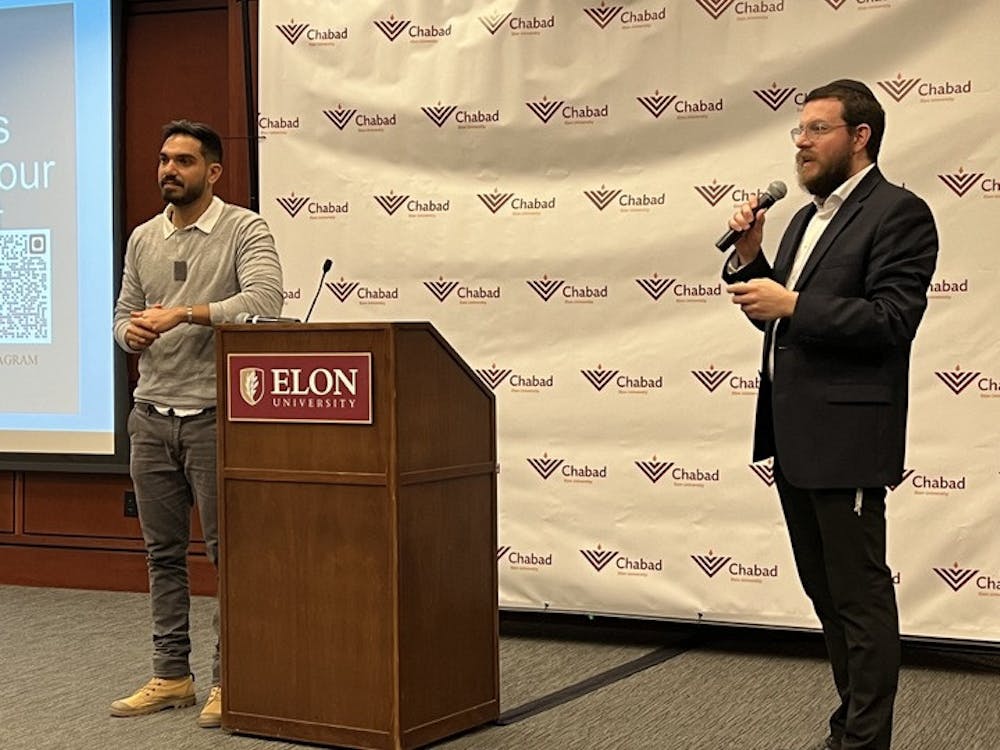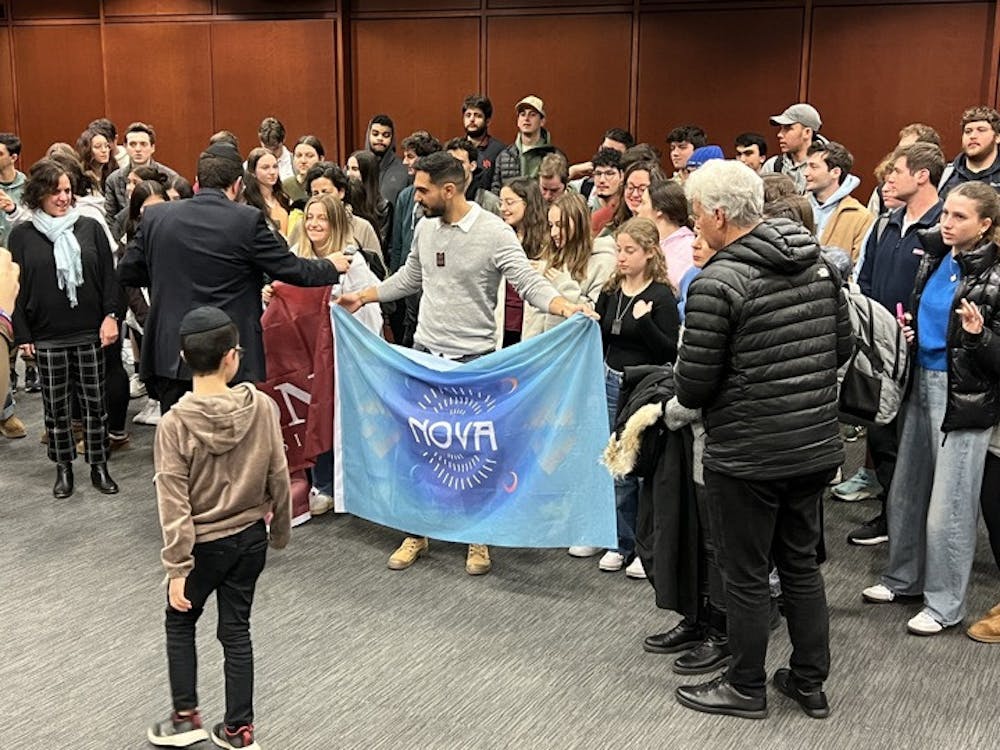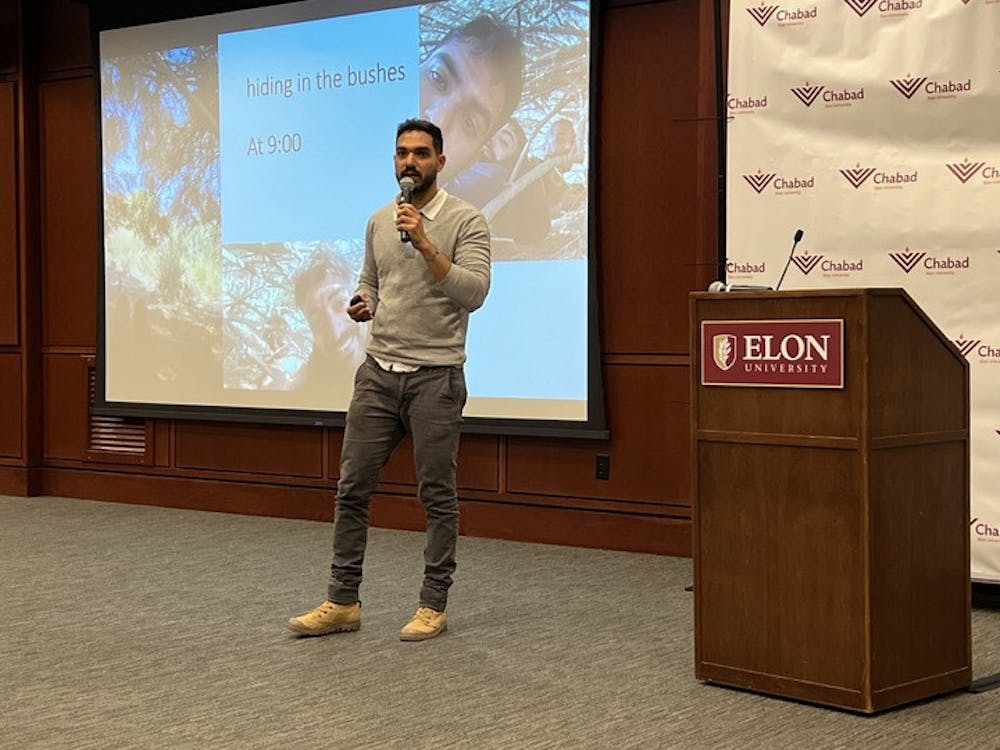29-year-old Rom El-Hai and two of his friends found themselves hiding in the bushes after fleeing from the Nova Music Festival on Oct. 7, 2023. Sharing the bushes with some other survivors, El-Hai said they couldn’t help but address their situation by asking a question:
What do you prefer, to be killed or to be kidnapped?
“Everybody had the same answer,” El-Hai said. “‘Of course to be killed, because who want to be in a place that’s worse than hell.’”
El-Hai, invited by Chabad at Elon, spoke to Elon University on Feb. 7 — exactly four months after the incident — and detailed his first-hand experience of the Hamas terrorist attack.

Israeli Rom El-Hai stands with Chabad Community Affiliate and Rabbi Mendy Minkowitz on Feb. 7 in LaRose Theater. El-Hai spoke about he survived the Oct. 7, 2023 Hamas terrorist attack.
First-hand testimony
El-Hai first arrived at the festival around 2 a.m. At around 6:30 a.m., El-Hai said he had looked up in the sky and saw missiles.
El-Hai said his first thought was being disappointed that the party might get shut down. Ten minutes later a police officer came to the DJ stage and told everyone to get their stuff and go home.
El-Hai said before he realized what was going on, three more police officers quickly moved deeper into festival grounds with their guns drawn as he and his friends left the festival. A couple minutes later as they sat in their car waiting to leave with everyone else, a car came speeding from the right and crashed into the cars ahead of him. As people opened the driver-side door to help, El-Hai said he saw a woman covered in blood fall to the ground.
After a man had screamed that she had been shot, a crowd of people approached the woman to help. Though his friend wanted to help, El-Hai convinced him that enough people had gathered at the scene. With none of them being doctors, the three made their way out of the festival.
“So we got into the road, and after a few meters, traffic again. And we’re stuck. And a security guy stand in the middle of the road and just screamed ‘Everyone get out of the car and run!’” El-Hai said. “So that's what we did. We get outside with the only thing that we have in our pockets, and we get inside to the forest and we’re hiding. From what? We don't know yet.”
Having been told to run for their lives again after emerging from the forest a few minutes later, El-Hai described an opening of gunfire, prompting him and his friends to hide between two cars on the side of the road.
At about 8:30 a.m., with events beginning to unfold on the news and his family and friends knowing he was at the festival, El-Hai got a call from his mom.
“I told my mom ‘I’m in a safe place, there’s a lot of military, a lot of police officers with me, a lot of people with me. … In a few minutes, it's going to be end and I will be back home soon. Don’t worry,’” El-Hai said. “It was totally a lie. I was alone — just me and my two friends — the bullets was fly over our heads. I wasn’t safe. But I had to lie to her because I don’t want her concerned and I just want to be focused to save myself.”
By 9 a.m. El-Hai and his friends had realized that their spot in between two cars was not safe and the group moved into the underbrush of a tree. With the gunfire continuing, El-Hai said he and his friends reasoned that the Israeli Defense Forces had moved into the area and engaged in a firefight with the enemy.
But as an IDF veteran, El-Hai realized after a few minutes that the sound of the guns firing was not coming from the standardized guns the IDF uses — but from the guns that Hamas uses.
“I heard a bullet come out of the gun and I heard a woman die,” El-Hai said. “I heard it — her last breath. You can hear someone die. And after I heard that, I heard a lot of celebrated scream. … There was a lot of shooting and people were happy. It’s like it was a birthday party.”
El-Hai and his friends traveled for the next few hours finding hiding spots to rest in, running into other people who had fled the music festival and searching for food and water. Along the way, they ran into several different military and police personnel who were unable to help them.
El-Hai said he and six other music festival survivors were eventually found by a police officer who had enough seats to take them to a village that was safe for the time being. Here, El-Hai said he was welcomed with hugs, food, water and electricity.
“Those people I won't forget for the rest of my life. It was very emotional. And for me, I was proud in that moment to be an Israeli. To be a Jew,” El-Hai said.
Elon reacts
Secretary of Chabad at Elon Gabby Nagel said she, along with other students in Chabad, have been organizing the event for approximately a month and a half.
Despite international tension, Nagel said that having the Elon community gather to hear El-Hai’s story is representative of Elon’s growing Jewish population and the feeling of community that Chabad represents.
“This campus is growing more Jewish so I think that it was important to pass things like this. Especially considering Oct. 7, I feel like we’re trying to increase our presence to make it more of a welcoming thing,” Nagel said. “We’re not necessarily for either side, we’re just here for telling the story.”

Israeli Rom El-Hai holds the Nova Music Festival flag alongside members of the Elon community in remembrance of the Oct. 7, 2023 Hamas terrorist attack. El-Hai shared his first-hand experience of escaping the festival with the Elon community on Feb. 7.
Senior Samantha Katz attended the event and said she had long been anticipating hearing El-Hai speak. Having traveled to Israel for her bat mitzvah, Katz said she knows people who live in Jerusalem and has been in consistent communication with them since Oct. 7, 2023.
“Hearing the story here has really been impactful — like you can’t make that up,” Katz said. “This is such an important story and this is one of so, so many other countless.”
Katz also said the most shocking parts of El-Hai’s story to her was the constant game of “cat and mouse”, where El-Hai would flee, find somewhere to hide and then flee again.
At the end of his talk, El-Hai said how sharing his story is his way of both healing through the trauma and spreading awareness.
“At some point, I really want to do something. So I heard about organizations that were great here, and it’s the first time that I’m here in the U.S., and knowing Jewish community around the world,” El-Hai said. “To be here with you tonight — it’s my therapy. After another presentation after presentation, and I meet you all and get a big hug, and when I came here for any communities, or Hillel or Chabad, I feel like I’m at home.”


